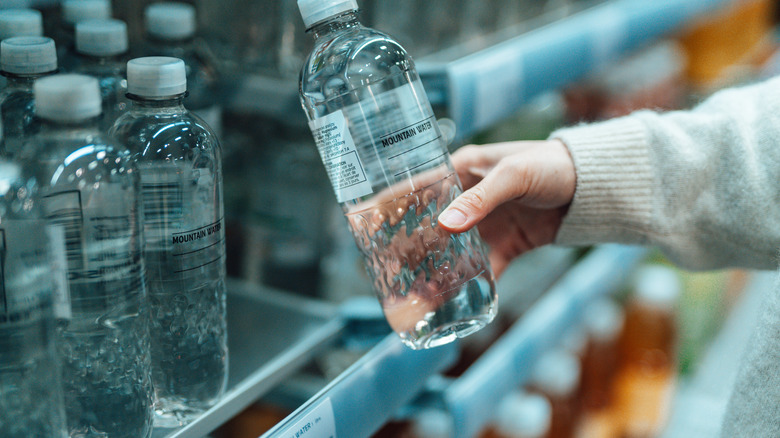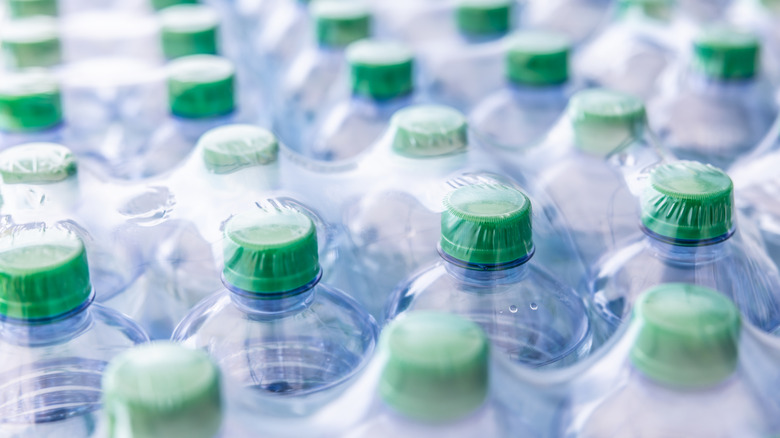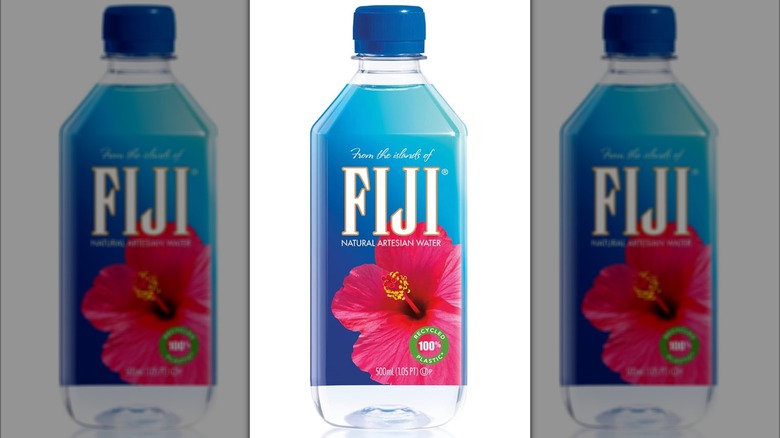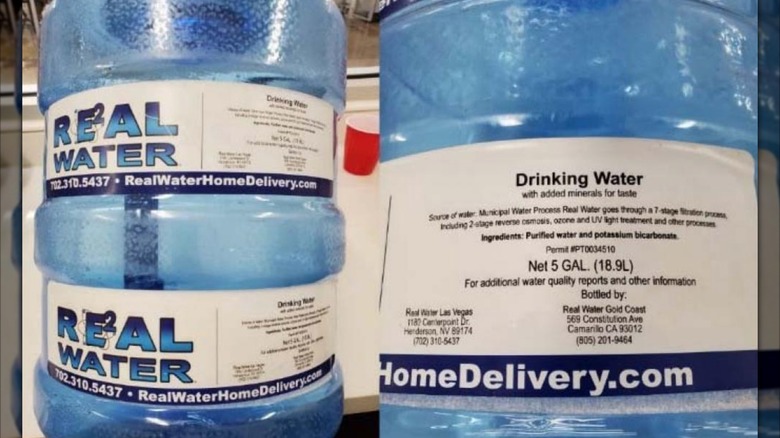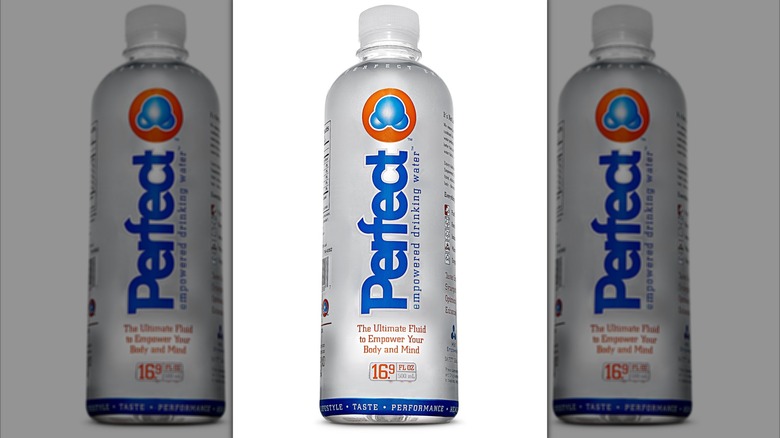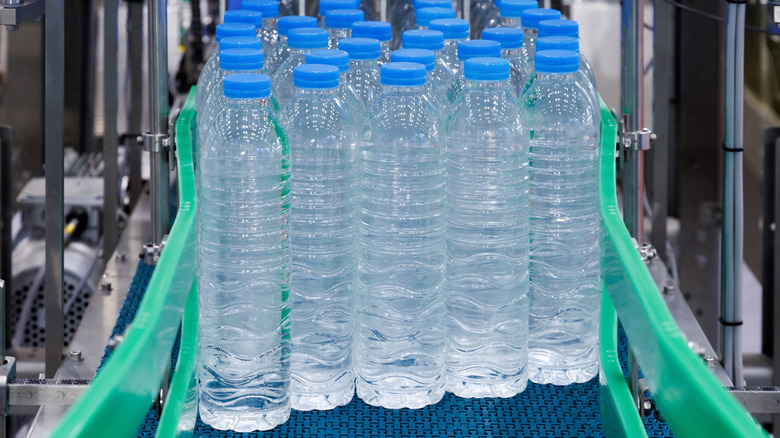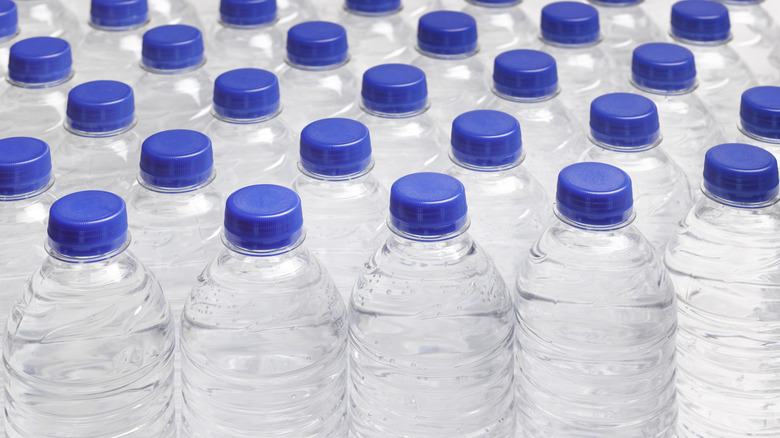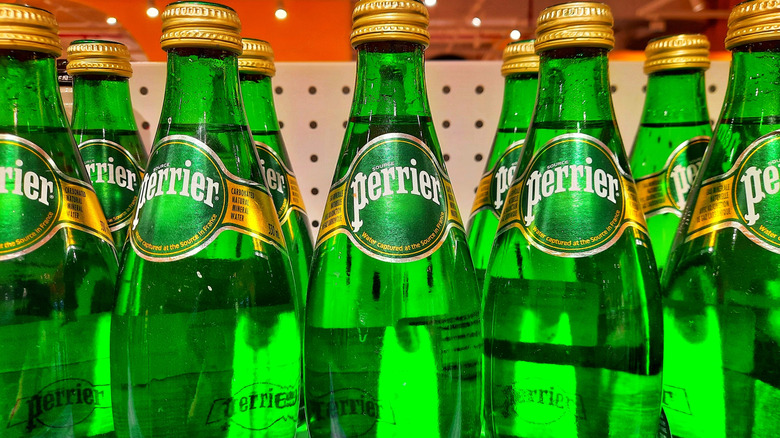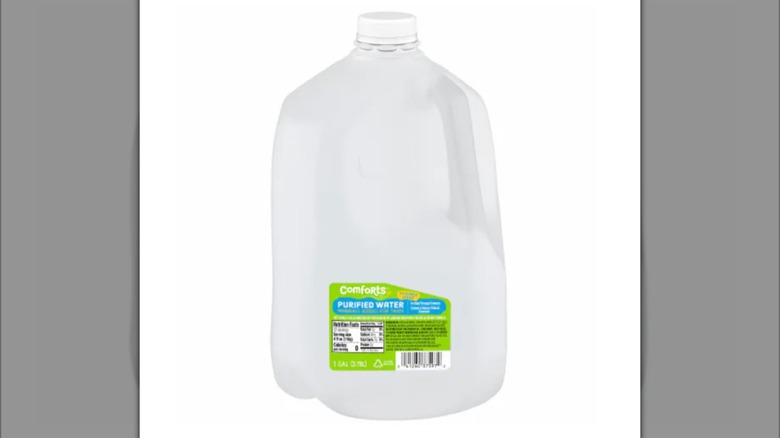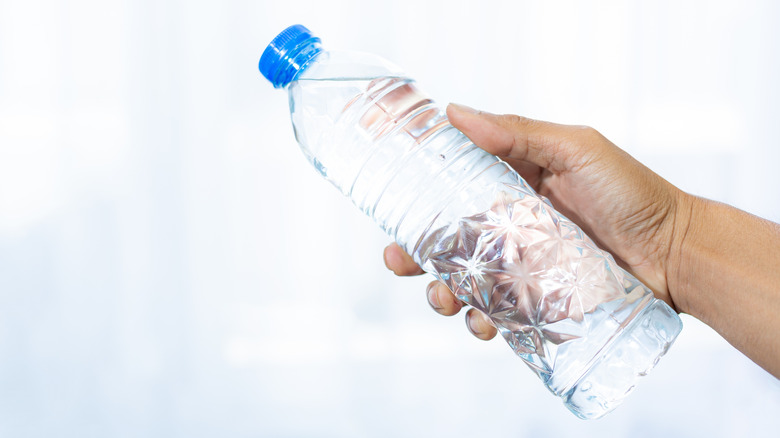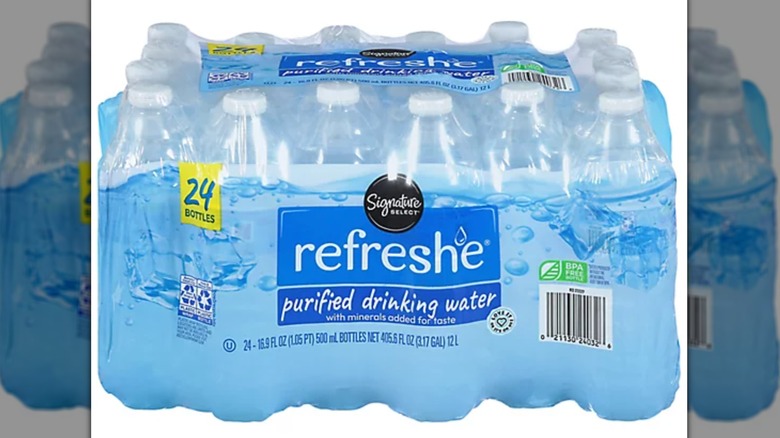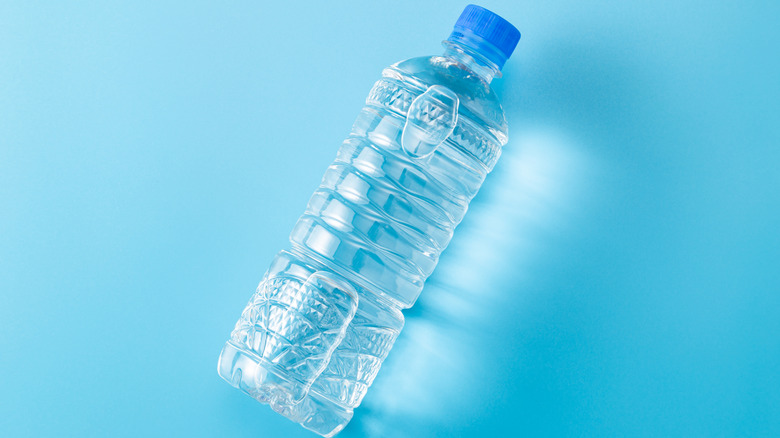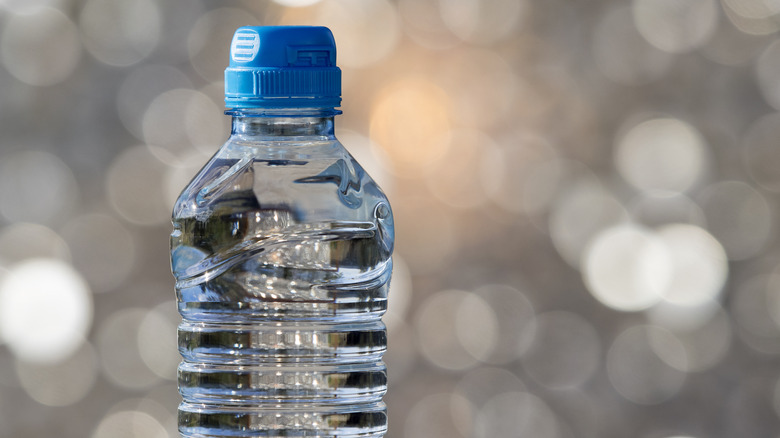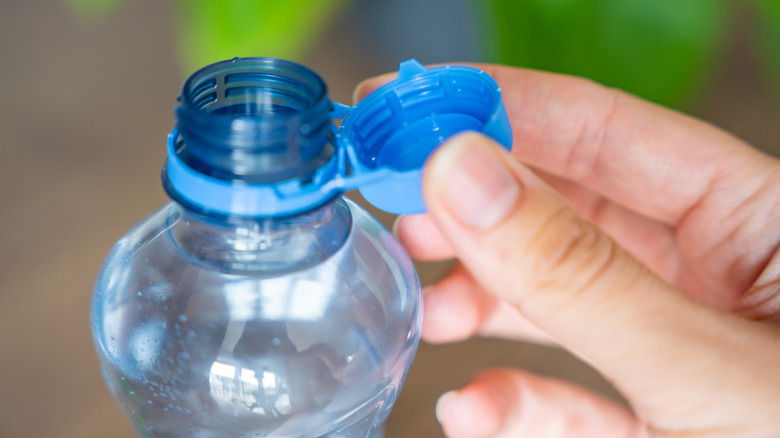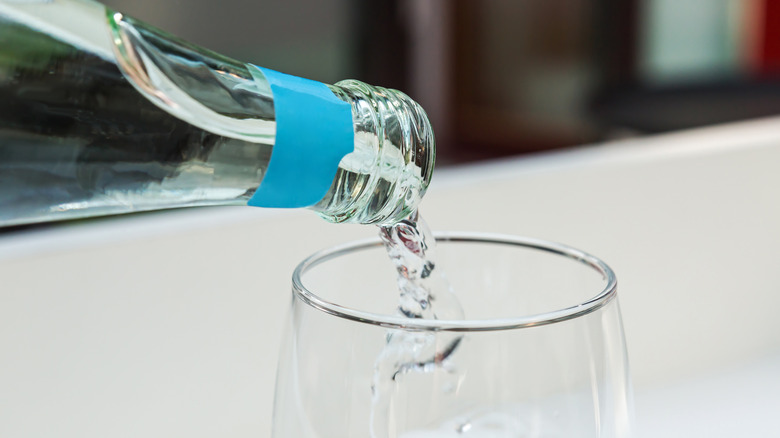14 Major Drinking Water Recalls You Should Know About
Of all the things that could be risky to consume, bottled water is surely bottom of the list. It's commonly considered a safe and sanitary alternative to tap water, being a go-to for anyone concerned about the hygiene of the mains supply, stocking up emergency shelters, or simply to make coffee taste better. However, it might surprise you to learn that drinking water can be just as likely to be recalled as any other food or drink product out there. Plus, what's interesting is how wide-ranging the reasons can be for a recall.
Drinking water can be contaminated with bacteria like E. coli, and while much bottled water out there has been distilled or purified, you can never be truly sure that it's safe. Bottled water can also be prone to containing traces of heavy metals or toxic contaminants that leach from the plastic into the water itself. If that wasn't bad enough, some recalls occur because the bottle the water comes in is deemed unsafe, often due to a manufacturing issue, or because the bottle and the water inside have developed mold. You may be avoiding bottled water because it's pretty expensive, but after you check out these recalls, you might start avoiding it for entirely different reasons.
1. Coliform bacteria resulted in a wide recall of water
Water is more likely to contain bacteria than you might think, and the mere risk of it can lead some folks to choose bottled water instead. Unfortunately, bacteria can still make it into those bottles in quantities that would make them unsafe, as a 2024 recall proved. Berkeley Club Beverages had to issue a recall for bottles of its purified and distilled spring water (which are different to regular spring water), which it was shipping in one- and five-gallon bottles, because of the presence of coliforms. While the bottles had only been shipped across three different states, this was still a hefty recall for the company.
When coliform bacteria are found in water, they can be the tip of the iceberg. These microbes are naturally present in the digestive systems of animals (and humans), and they may not be harmful themselves. However, the presence of coliforms can flag that other, more harmful pathogens could have made their way into the water, which may result in food poisoning. This is why coliforms are known as "indicator" bacteria; by testing for them, food companies and health organizations can catch issues before it's too late, while also saving time and money instead of testing for every type of harmful bacteria out there.
2. A combo of contaminants caused a recall of almost 2 million bottles of water
You know what's worse than one contaminant? Two ... or three ... or even four different contaminants. Unfortunately, this was the situation in which Natural Waters of Viti Limited found itself in 2024, when it had to put out a massive recall of its Fiji Natural Artesian Water. The company had to track down almost 1.9 million bottles of water when it discovered that they contained excessive levels of manganese, as well as three different types of bacteria. Who'd have thought that bottled water could have so much bad stuff in it?
While the trio of bacteria was definitely concerning, it's the manganese that was the real problem here. Manganese is a normal component of water and is also present in many different foods, and you need a tiny amount of it to maintain proper health. However, if you consume too much of it, things can get really risky. High levels of manganese can prompt a disease called "manganism," which can result in a host of neurological symptoms like speech disturbances and tremors, according to a report published by the Agency for Toxic Substances and Disease Registry.
3. Possible non-viral hepatitis infection prompted a 2021 recall
The last thing that bottled water should be causing is serious illness, or even death. However, in 2021 that became a very real, terrifying possibility, prompting a full recall of bottled water brands in different sizes. Real Water, Inc. had to recall all of its Real Water bottles over concerns that drinking it could be linked to the development of non-viral hepatitis. The recall occurred following multiple people developing the disease, and at least one person who died following a liver illness, who it was believed had drunk the water.
What was made even more worrying was that Real Water was marketed as a drink that could have a wholesome or detoxifying effect. The water was sold as being ionized and "alkaline," which potentially led customers to believe that the drink might help them — and not carry deeply dangerous consequences. While it's unclear exactly how the water may have become so risky to drink, its manufacturing method, which involved treating it with lye and other potentially risky chemicals, may have had something to do with it. The company was instructed by federal authorities to destroy its potentially harmful products immediately.
4. Manufacturing issues led to a recall of Perfect Empowered Drinking Water
When you buy a bottle of water, you expect it to be sealed and safe with a well-formed, airtight join between bottle and rim that prevents any contamination. Sadly, that's sometimes not the case, as a 2020 recall showed. The snappy, inspirationally-named Perfect Empowered Drinking Water had to go to work battling a recall as everyone else was battling COVID-19, due to the fact that some bottles may have been damaged, with their rims potentially compromised.
The voluntary recall notice, which was issued via Amway, indicated that a manufacturing issue may have led to the damage. The fear was that the potential impairment of the product may have led to plastic particles getting into the water — and then into the bodies of anybody who drank it. Amway was quick to point out that it didn't consider the issue to be a safety risk, which seemed to indicate that any plastic particles in the water could have been pretty small. However, we think it's fair to say that most people don't want bits of stray plastic floating around in their water.
5. In Ireland, bottled water was recalled over arsenic levels
What do you like in your bottled water? A little bit of arsenic, perhaps? No, we didn't think so. If you were buying bottled water in Ireland in 2019, though, consuming a product that contained one of the most famously poisonous substances in the world was a real possibility. The bottled water, which came in two store-brand options sold in convenience stores, was recalled after excessively high levels of arsenic were found in them. Shortly after the initial recall was put out, a second recall was announced, this time encompassing a much wider range of branded bottled waters.
Thankfully, the levels of arsenic that were found in the recalled water bottles were not thought to be unsafe, either on a short-term or a long-term level, so it seems that the recall was precautionary. It's worth remembering that while high levels of arsenic are deadly, the element is naturally occurring and can be found in water sources around the world. Naturally, though, things get a little riskier when arsenic levels become elevated if the element is potentially not being filtered out as rigorously as it should be.
6. Bottled drinking water was recalled in 2019 because of of PFAS
Bottled water isn't always free of chemicals, and a 2019 recall due to the presence of PFAS (or per- and polyfluoroalkyl substances) in the water proved this pretty starkly. Bottled water brands supplied by Spring Hill Dairy, Inc., produced in Massachusetts, were found to contain six to seven times the amount of PFAS than they should have. This prompted certain branded products that contained the Spring Hill Dairy water to be recalled.
What was notable about this recall was that Spring Hill Dairy resisted issuing the notice itself, pointing out that there was no legal requirement for the company to do so, and citing its new filtration system. This was despite the Massachusetts Department of Public Health releasing a statement urging people to avoid the water. Instead, it fell on the brands that contained the water to recall their products individually. You'd think that the concern around PFAS would cause Spring Hill Farms to act a bit more decisively, huh? PFAS are long-lasting commercial and industrial chemicals that work their way into different aspects of the food chain, which have been found to produce severe health consequences, including impacting fertility and the immune system, and potentially causing cancer. Removing PFAS from drinking water is a key stage for water producers, and their presence is never a good thing.
7. Perrier conducted a massive product recall in 1990
Perrier is one of the biggest sparkling water brands out there, and you can generally rely on its products to be widely available, consistent, and above all, safe. Back in 1990, though, that wasn't the case. Perrier's entire stock had to be removed from stores after it was discovered that some of its water bottles contained benzene, a naturally occurring chemical that's commonly used in industrial applications. The presence of this unpleasant substance was totally at odds with the image that Perrier tries to portray, which is one of wholesomeness and vitality.
Importantly, it seems as though this recall was conducted out of a combination of caution and brand management. At the time, the Food and Drug Administration (FDA) pointed out that the amount of benzene in the bottles was low enough to not cause concern, and even drinking it regularly would likely not cause any notable health issues. However, it seems that the potential consequences of consuming higher amounts of benzene, as well as the reputation of the chemical itself, were enough to prompt the company to get its bottles back. Benzene can be found in gasoline and cigarette smoke, and ingesting high amounts of it can lead to vomiting, convulsions, or even death. Lower, long-term exposure to benzene can also increase the risk of cancer.
8. Mold was found in purified water for babies, leading to a recall
You know what people really don't want in their bottled water? Mold. Plus, you know who really shouldn't be drinking moldy water? Babies. Sadly, this incredibly unappealing (and risky) combination became a definite possibility in 2017, when gallon containers of Comforts for Baby Purified Water with Fluoride Added had to be recalled due to mold contamination. The water, which was sold by The Kroger Company, was distributed to various different stores that operate under the Kroger umbrella. To add insult to injury, the issue potentially affected water produced over the course of roughly six months. The company had to get back a pretty large amount of product, making this yet another recall that Kroger likely wants to forget.
The mold was a strand called Talaromyces penicillium which, despite its name, is distinct from the drug, penicillin. This mold may have been invisible to the naked eye in these bottles, but that didn't stop it from potentially being hazardous. Talaromyces penicillium can produce allergic responses and asthma attacks, as well as skin and eye irritation. It's especially harmful to babies or infants who are immunocompromised or have congenital HIV, making this recall particularly urgent.
9. Possible E. coli contamination led to a wide recall in 2015
E. coli gets everywhere. This bacteria is a common cause of food poisoning and it can potentially pop up in even the safest-seeming products, like bottled drinking water. The risk of E. coli contamination was the cause of a 2015 recall notice issued by Niagara Bottling, which announced that it had discovered the potential presence of its bacteria in one of its spring sources. As a consequence, the company had to recall products sold by 14 bottled water brands, including those sold by major stores like 7-11 and Wegmans.
E. coli live in the digestive systems of animals, but these microbes become dangerous when they leave the body via fecal matter. When this happens, rainwater or melting snow can move the bacteria into water systems, and it then washes downstream to the spring source where the water is bottled. Most of the time, coliforms like E. coli are caught and filtered out before they end up in your bottle of water, but in this instance, it seems the filtration wasn't thorough enough. Thankfully, Niagara Bottling only had to recall water produced in just over a week-long timespan, which likely helped it track down the products more easily.
10. 1.6 million cases of bottled water were recalled for potentially containing plastic shards
Drinking water recalls can vary considerably in size — but when they're big, they're really big. One of the larger bottled drinking water recalls occurred in 2012, when 1.6 million cases of Refreshe Purified Drinking Water had to be tracked down by retailer Safeway. The recall was prompted after plastic pieces were thought to potentially be in certain affected water bottles, with some pieces being as long as 12 millimeters, presenting an issue for anybody drinking them and a potential choking hazard for younger children or infants.
It's unclear exactly how these plastic pieces ended up in the water. Pieces of that size are different to nanoplastics, which break down from larger plastic pieces and are invisible to the naked eye, and which can be abundant in bottled water. Instead, it seems that these larger plastic pieces may have ended up in the water as a result of a manufacturing issue or the deterioration of factory equipment, which can be a common cause of food recalls due to the presence of foreign objects.
11. A 2011 recall was prompted by mold
Although bottled water doesn't technically expire, it can still get moldy, and contamination from mold is surprisingly common. In 2011, it was the cause of yet another recall. Mountain Pure, a water company based in Arkansas, had to recall bottles of its drinking water after it found mold in some samples. It was unclear at first exactly what type of mold it was that got into the water, as well as how it got in there in the first place — but given that any mold is usually not an attractive prospect, it's good that the company acted quickly.
What made this recall particularly troubling was what the water was intended for. Rather than being sold in stores to customers, the affected Mountain Pure water had been shipped to Clinton, Arkansas, for future use during any upcoming disaster efforts. We're thankful the company found the problem when it did, as we can't imagine anything we'd want less than having to drink moldy water during a time of crisis.
12. Wegmans bottled water was recalled because of excessive bromate levels
For something that's meant to be tasteless, pure, and pretty much universally good for us, water has a knack for soaking up a lot of unpleasant contaminants that we'd rather not be consuming. One such contaminant is bromate, which in 2008 made its way into bottled water sold by Wegmans at well over twice the quantity that's considered safe. As a result, the retailer had to recall its Food You Feel Good About Spring Water from its shelves.
While Wegmans was quick to note that drinking its water wouldn't result in any immediate health issues, it was wise to recall it as quickly as it could. In industry, bromate can be created when ozone reacts with bromide, with both components coming together when water is being disinfected. From this vital process comes a contaminant that may, in large quantities, result in gastrointestinal issues with an impact on your kidneys, especially if you're more prone to kidney-related illnesses. It's worth remembering that at low levels bromate presents a pretty small risk to health, but it's important to limit exposure where possible.
13. Millions of bottles of water were recalled in 2003 after they presented a choking hazard
The bottles that drinking water comes in, and particularly their lids, can be a notorious choking hazard. Recently though, companies have made way more efforts to reduce the risk that their bottles present, with lids that remain attached to the bottle itself. We have to imagine that a lot of these advancements have come as a result of high-profile stories of choking occurrences and recalls like the one that took place in 2003. That year, over three million bottles had to be recalled because of the choking hazard they presented — because their lids were coming off without any warning. It seems that a manufacturing issue led to the lids being looser than usual.
It didn't help that the affected bottles were sold under five different brand names, giving the manufacturer CCDA Waters a pretty big job to do. The saving grace of this recall was that while the issue had the potential to cause harm or even death, CCDA Waters noted that at the time of the recall, nobody had been significantly affected. We're willing to bet that some tighter manufacturing checks were introduced after this one.
14. Defective bottles led to a sparkling water recall
People love the way certain drinks really do taste better from glass bottles, but some are squeamish about purchasing them because they're afraid the glass will shatter in their hands. Normally those fears are completely unfounded. In 1998, though, the prospect of your glass bottle breaking while you opened it was a real possibility, if you were buying a bottle of flavored Calistoga Sparkling Mineral Water. The company that made the brand, Calistoga Mineral Water Co., had to recall its bottles after almost two dozen customers complained that their products were breaking as they opened them.
Apparently, the issue was in the rim: When people tried to twist the cap off the bottle, the rim broke, creating a serious safety hazard. Folks who were unaware of the breakage may have then put the bottle to their lips, cutting their mouth — or the bottle could have broken further, resulting in cut hands. A large number of flavors were affected, with the company having to pull roughly 28,000 bottles off shelves.
